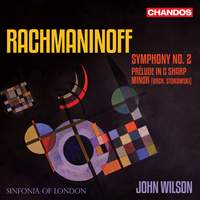Recording of the Week,
John Wilson conducts Rachmaninoff
After superb accounts of Symphony No. 3 and The Isle of the Dead last October, John Wilson and Sinfonia of London continue their Rachmaninoff series with one of the composer’s best-loved works – the Symphony No. 2 from 1908, which restored his faith in his abilities as a symphonist after the poor reception of its predecessor a decade earlier.
The symphony is prefaced here by Stokowski’s transcription of the Prelude Op. 3 No. 2 in C sharp minor, which Rachmaninoff composed shortly after graduation. The piece became so popular that by 1921 the composer (wearied by incessant audience demands to offer it as an encore) declared that he ‘wished he had never written it’, but I’ll wager that Wilson’s glorious technicolour account could have revived even his jaded enthusiasm: low brass rasp and snarl, glassy tremolo strings curdle the blood, and sonorous carillons sing out with a gravitas which more than justifies the nickname ‘The Bells of Moscow’.
 It's one hell of a curtain-raiser, but Wilson’s approach to the symphony itself is so dramatically different from his blood-and-thunder take on the Prelude that it’s as if he’s gently pranking his audience by setting up expectations which he goes on to subvert – there’s a sense that he’s let his brass section fully off the leash in the opener in order to get some of that raw energy out of their system for the main event, for this is an account of the symphony that’s notable for its balance, clarity, and even restraint. If you’re accustomed to the elemental cragginess of André Previn’s landmark recording with the LSO (one of the first to present the symphony without cuts), Wilson’s clear-eyed, almost urbane perspective may take some settling into, but this is an interpretation which plays the long game – and when the pay-off eventually comes, it’s all the more delicious…
It's one hell of a curtain-raiser, but Wilson’s approach to the symphony itself is so dramatically different from his blood-and-thunder take on the Prelude that it’s as if he’s gently pranking his audience by setting up expectations which he goes on to subvert – there’s a sense that he’s let his brass section fully off the leash in the opener in order to get some of that raw energy out of their system for the main event, for this is an account of the symphony that’s notable for its balance, clarity, and even restraint. If you’re accustomed to the elemental cragginess of André Previn’s landmark recording with the LSO (one of the first to present the symphony without cuts), Wilson’s clear-eyed, almost urbane perspective may take some settling into, but this is an interpretation which plays the long game – and when the pay-off eventually comes, it’s all the more delicious…
As their two recordings of early twentieth-century repertoire amply demonstrated, the strings of Sinfonia of London are one of the wonders of today’s orchestral world, and Wilson and the Chandos engineering team throw the spotlight squarely on them for large stretches of a work where we’re often used to hearing the brass take centre-stage.
The experience is a little like seeing a familiar painting illuminated from a different perspective so that previously overlooked details spring to the fore, and the players rise to the challenge quite brilliantly: listening to the opening few minutes, I recalled a conversation with Vasily Petrenko (no slouch in the Rachmaninoff department himself), where he remarked that one of the secret ingredients in making Russian repertoire come alive was to have each member of your string-section play like a soloist, sustaining the intensity of attack throughout the entire bow-strokes, matching that energy in the left hand, and ‘embracing the colour of the G-string’.
Wilson’s ‘rows and rows of the finest virtuosos’ do all of this and more in that opening section and beyond, and the synchronicity of portamento and vibrato (both used surprisingly sparingly until the last few minutes of the symphony) is a marvel, as is the accuracy of the fiendish collective passagework in the Scherzo-like second movement – where, dare I say it, the precision and clarity surpass the Previn recording, partly thanks to the sharper sound-engineering.
The two central movements in particular have an almost Classical poise here, which reminded me that works like Stravinsky’s Petrushka and Prokofiev’s Classical Symphony were just around the corner: the Scherzo is buoyant and balletic in comparison to Previn’s mud-on-the-boots earthiness, and the famous clarinet solo in the Adagio is given with a near-Mozartian elegance that's the polar opposite of Jack Brymer’s heart-on-sleeve rubato for Previn.
It's only in the last movement that the collective gloves to come off, and the contrast with what’s gone before renders it all the more impactful: the brass are finally allowed free rein in the exuberant fanfares, and the strings throw caution and 'good' taste (overrated virtues in this score anyway) to the wind with lashings of Hollywood-esque gloss and vibrato. It might not displace Previn, Temirkanov, Rozhdestvensky et al (and who would want to?), but this refreshing, ear-opening take on the piece is well worth hearing on its own terms.
Sinfonia of London, John Wilson
Available Formats: SACD, MP3, FLAC, Hi-Res FLAC
Sinfonia of London, John Wilson
Available Formats: SACD, MP3, FLAC, Hi-Res FLAC




